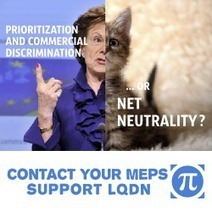The telecoms industry is currently one of the leading growth sectors in the global economy for a number of different reasons, including the emergence of telecommunications as one of the most important components of business, social, cultural and...
Research and publish the best content.
Get Started for FREE
Sign up with Facebook Sign up with X
I don't have a Facebook or a X account
Already have an account: Login
on peer-to-peer dynamics in politics, the economy and organizations
Curated by
jean lievens
 Your new post is loading... Your new post is loading...
|
|













